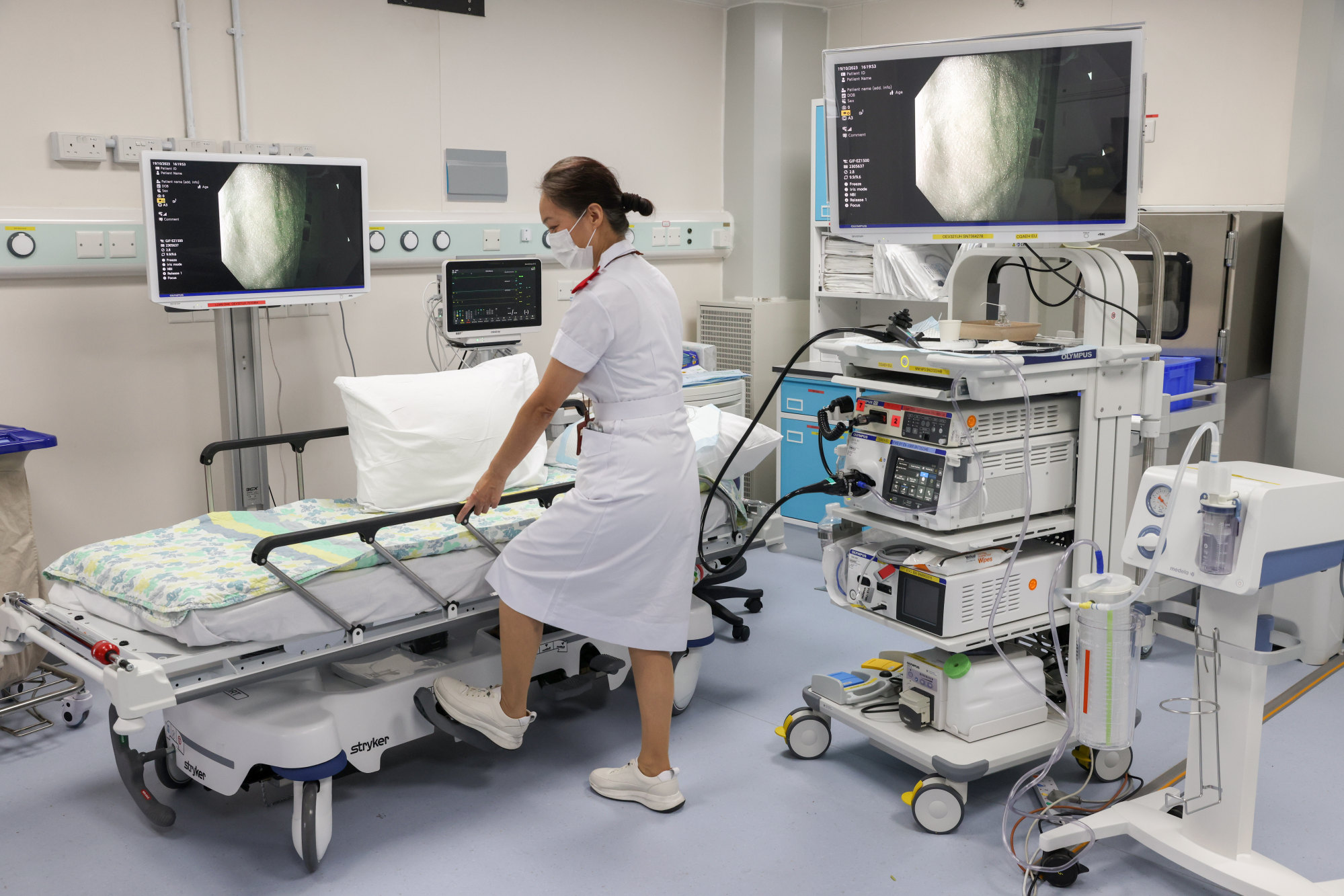
Makeshift Hong Kong Covid-19 hospital to offer more services as authority targets ‘pressure points’ in public sector
- Patients referred from public hospitals will be able to receive endoscopy and sleep tests from October 31 at facility in Lok Ma Chau Loop
- New microbiology laboratory has been screening patient samples for multi-drug resistant organisms since October 3
A makeshift hospital built for Covid-19 patients will further expand its services by providing endoscopy procedures, sleep tests and microbiology screening to help reduce the burden on Hong Kong’s stretched public sector.
Patients referred from public hospitals will be able to receive endoscopy and sleep tests at the facility located in the Lok Ma Chau Loop near the border with mainland China from October 31.
A microbiology laboratory has also been in operation to screen for multi-drug resistant organisms since October 3.

“In the past six months since we began our operation, the response from patients has been great, which is heartening,” said Dr Sin Ngai-chuen, clinical stream coordinator of the Hospital Authority’s New Territories East cluster.
“We have seen room for further expansion in accordance with the increasing demand for certain services.
“The infrastructure here allows us to further expand our services and match the needs of our patients. We are targeting the bottlenecks or pressure points at public hospitals.”
Initially designed to hold 10,000 Covid-19 patients, the makeshift hospital was finished with Beijing’s help in April 2022 but left dormant until the authority took it over in January this year.
Makeshift Covid hospital in Hong Kong to be used for radiology services
It began offering computerised axial tomography (CAT) and magnetic resonance imaging (MRI) services to patients referred from New Territories East public hospitals in April. Services were further expanded to cover public hospitals across the city in July.
Sin said the hospital had since handled 4,484 cases and had been increasing its capacity for the two services over the past three months. It was expected to complete 8,000 scans by the end of the year.
“The waiting time for patients who underwent scans here has been greatly reduced,” he said. “For CAT, it was shortened from 123 to 38 weeks. For MRI, it was cut from 122 to 50 weeks.”

Sin said the hospital had also started offering contrast-enhanced computed tomography in July, with 231 scans completed as of last month. It will expand the service to patients referred from public hospitals across the city from December.
Ultrasound scans would also be provided from December, with a daily quota of 18 patients, he added.
Sin said that from October 31, five sessions of high-resolution endoscopy tests would be conducted at the hospital each week under a pilot scheme and the number could rise to 10 later.
Public hospital patients, aged 18 to 70, who are non-urgent cases and have been referred from family medicine departments or waited for more than six months at specialist outpatient clinics will be eligible.
Hong Kong’s makeshift Covid-19 hospital will add services to help public sector
“The scheme aims to serve patients suffering from stomach aches and acid reflux. They have a relatively low urgency for the service. But they can queue for it for a very long time at public hospitals,” Sin said.
“I have seen that they may have to wait for a year or two and the time can be shortened to three months if they are willing to come to our hospital.”
Sin said 10 rooms would be used to provide 40 sleep tests per week from October 31, with patients required to stay overnight and a team of nurses monitoring them.
“We will provide screening services for patients who have a mild case of snoring or are concerned about having severe sleep apnoea. If there is any problem, we will conduct further tests,” he said.
1 in 4 adult deaths in Hong Kong public hospitals related to sepsis, study finds
“Public hospitals mainly deal with serious apnoea cases. With limited beds, sleep tests are mostly available for urgent cases. Here at our facility, we have more room to handle mild cases.”
He said patients with mild cases were usually asked to conduct tests at home, but 20 per cent would need to redo them due to errors, adding that carrying them out in hospital could ensure a high success rate.
Dr Viola Chow Chi-ying, infection control officer for New Territories East hospitals, said patient samples had been tested for multi-drug resistant organisms at the facility’s new microbiology laboratory since October 3.
“The demand for screening for the [organisms] has been increasing and it has led to an increase in pressure on our staff in the cluster hospitals,” she said.
Chow said the facility had unused advanced equipment after its completion, so some specimens were diverted there.
The laboratory was expected to handle 6,000 specimens per month from April next year, it capacity, she added.

